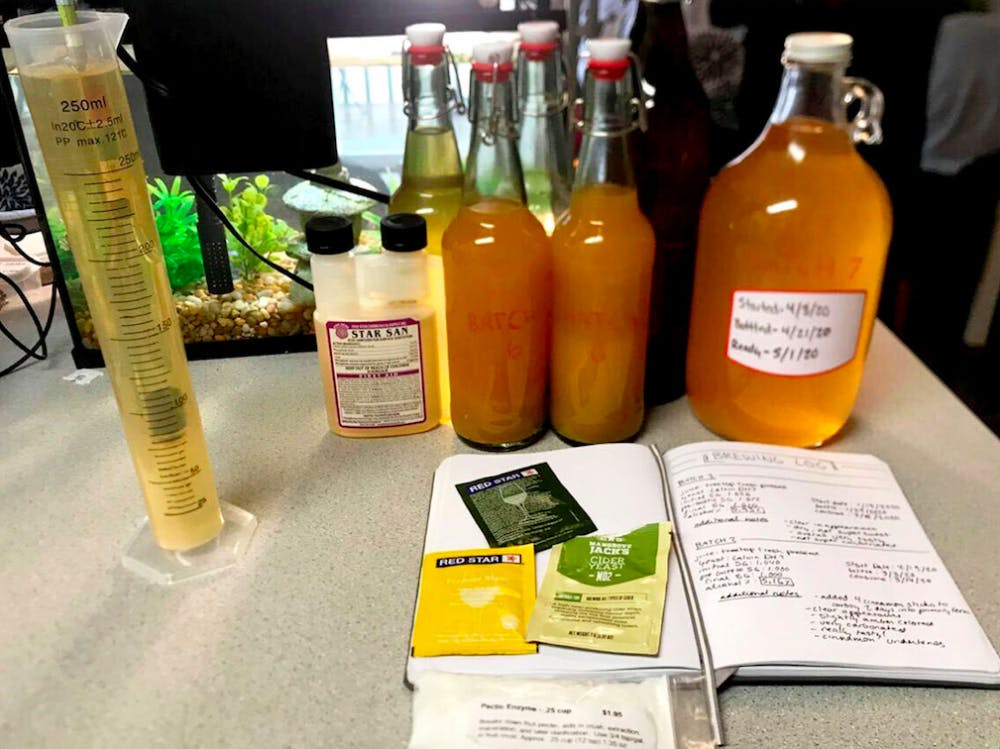
Sea glass, home brewing, unicycling — activities for the average WWU student
By Mazey Servin
JoAnna O’Neill, a fourth-year student at Western, is spending her time in quarantine making her own brewing distillery right in her apartment. She has been experimenting with home brewing her own ciders.
“I need a hobby that I can do alone in my apartment, by myself, that's not super expensive or anything,” O’Neill said. “I was like, ‘Okay, well what do I like?’ I really like science and I really like drinking.”
Through the COVID-19 outbreak in Washington state, Gov. Jay Inslee issued a “Stay Home, Stay Healthy” order on March 23 to minimize the amount of activities happening, so that the spread of the virus reduces.
During the “Stay Home” order, Western students have been finding more free time to start up new hobbies.
O’Neill started her home brewing by watching YouTube channels and googling how to brew ciders. It turns out that making cider is easier than beer, O’Neill said.
To start the primary fermentation, a carboy, a big glass jug, is needed. Then an airlock is also needed to allow the gas to leave but not come back in, O’Neill said.
Some of the ingredients that go into making the ciders are apple juice with little to no preservatives and yeast. To prevent natural yeast or bacteria from making the cider taste bad or turn into vinegar, everything needs to be sanitized first, O’Neill said.
A hydrometer tests the alcohol content of the cider and helps determine the sugar concentration of the liquid, O’Neill said.
“It's basically a graduated cylinder and then you drop this little weighted glass tube on it that has markings and then you read where it floats up to it [and record it],” O’Neill said. Leave the carboy in a dark place for about ten days to two weeks, O’ Neill said.
After the primary fermentation is finished, “combine [ the liquid] with the sugar and then [pour] it into bottles,” which go into secondary fermentation, O’Neill said. Then they will sit for another 10 days to two weeks.
O’Neill has made some successful batches when making her own ciders.
“I'm not only learning from and benefiting from it, but I also just get cider out of it, too which is nice,” O’Neill said. “You have a physical product that you can give to your friends and consume and it's nice.”
Since the “Stay Home, Stay Healthy” order has been extended to May 4, Western students might have more time on their hands to practice hobbies such as unicycling like Walt Ellis, a second-year student at Western, who has been practicing his skills.
Being active helps Ellis keep a routine to his meal and sleep schedule, he said.
“I hadn't been able to work much on new unicycle tricks in a while because of classes and stress and everything taking up time,” Ellis said. “I figured it was a great excuse to get out to just have a bunch of free time on my own to work on some skills and stay active.”
Ellis has been working on wheel walking and 180 unispins. Wheel walking is walking the unicycle by having your feet on the wheel instead of the pedals. 180 unispins are where a person jumps up and spins the unicycle while landing it straight, Ellis said.
Ellis said it brightens his day to have a goal to go out and unicycle everyday.
“I like taking up a kind of odd, new hobby,” Ellis said. ''I thought it just seems really cool to ride a unicycle. It looks so implausible and I thought it was impressive, so I just decided to go and learn.”
Violet Bender, a first-year Western student, has been able to continue her hobby of collecting sea glass at the beach in Marine Park uninterrupted by the quarantine.
“I have always been collecting sea glass since I was a little girl with my grandma down in Birch Bay,” Bender said. “I've always just had a drawing to the nature of the ocean and water. Every time I go to the beach, I always try to find sea glass and seashells because I just feel like they're just really pretty little tokens from the beach.”
Bender used the sea glass to make Canadian sculptures called inukshuk that she said are like Canadian good luck charms.
“It's been very therapeutic for me because I don't have a job right now, so I'm very stressed out and it's really important for me to find hobbies that take my mind off the fact that I'm broke,” Bender said.
Sea glass comes from pieces of broken glass bottles left on the beach and swept away by the water, which wears down the glass overtime, Bender said.
“I really admire the beauty of it, even though it's a man-made thing, it's also interesting to see how the ocean formed it to that type of piece of glass that gets all smooth and rugged looking,” Bender said. “Now [it’s] not as harsh on the edges, so it's kind of interesting for me to see how this man-made thing is kind of created also at the same time by nature.”





